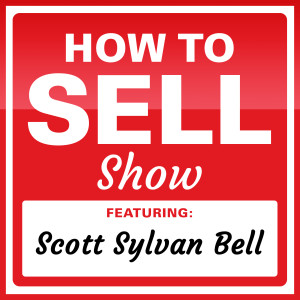Episodes

Monday Jan 27, 2020
HTSS38 - Objections in sales and answers to them - Scott Sylvan Bell
Monday Jan 27, 2020
Monday Jan 27, 2020
Why salespeople don’t understand objections
Most sales trainers don’t understand how people make decisions. If you don’t know how people make decisions how can you really deal with objections or even teach how to sell. One of the problems is sales skills and knowledge are passed down from trainer to salesperson. The tough problem is most sales hasn’t changed much since 1940. Sales training has been recycled over and over again.
The History of sales training
Most sales training started in the 1940’s after WWII. There were cultural shifts that allowed for the sales processes taught to work back then. As buyers have become more savvy these old school sales tactics are losing power. Most sales techniques and closing sequencing are made fun of now.
The viscous circle of sales training
Most sales training today is a viscous circle that follows this pattern:
- Discovery
- Presentation
- Hard sell
- Objection
- Discount / price match
What makes this worse is most sales trainers teach salespeople just keep talking and over talk the buyer. Your key to closing deals always will come down to using emotions in the sales process and asking the right questions.
The Nervous Energy Problem
Most salespeople do not understand nervous energy and because of the way they are taught they chase after objections that are not there. What was one objection has now lead to 2 objections. Nervous energy is seen as the objection and it is chased or tackled by old tactics.
The wrong objection is targeted and regret is built from the buyer. The buyer makes the purchase and then they want to cancel and or ask for more discounts after the sale.
The objection can be a test from the buyer:
You will see that some objections are a test from the buyer to see where you are as a salesperson. This test is to see how strong your sales game is and if they can trust you with their money.
Your buyer is looking for clues to see if you are who you say you are. Your vocal pitch and tone can reveal if you are telling the truth of if you are a liar. This is a dance and you need to know it. You must know the moves to work in symphony with the buyer. Most of the time salespeople have a problem because the timing is wrong in the conversation. Buyers see the salesperson as a fraud and then it gets to discounting to close the deal. Discoutning does not lead to trust in the sales process.
If you want to close sales you will need to be slow and methodical. The closing sequence can take 1/10 of the sales process time. If you are in a 2 hour presentation the closing process can cake 12 minutes. Most salespeople are not patient enough or do not take enough time to work through the concerns with their buyer. Flat out salespeople get tired or run out of things to talk about.
The truth about rejection
You can feel rejected when you put time, effort and energy into anything. Its ok to feel rejected when you have put in the work.
The tough conversation is that most salespeople did not put in the work to be rejected, they feel regret for not putting in the work.
Look at the best technology to close deals
If you want to learn how to sell more you will need to learn how to anchor. You can use the emotions built up in the presentation with the buyer to help build trust and work through the decision making process.
One of the best ways for you to learn how to sell more is to pay attention to how people make decisions. There are great books out there that teach decision making.
Scott Sylvan Bell
@scottsbell
#sales #closer #success #Sacramento #podcast #howtosellshow
This episode was recorded in Sacramento California


Comments (0)
To leave or reply to comments, please download free Podbean or
No Comments
To leave or reply to comments,
please download free Podbean App.